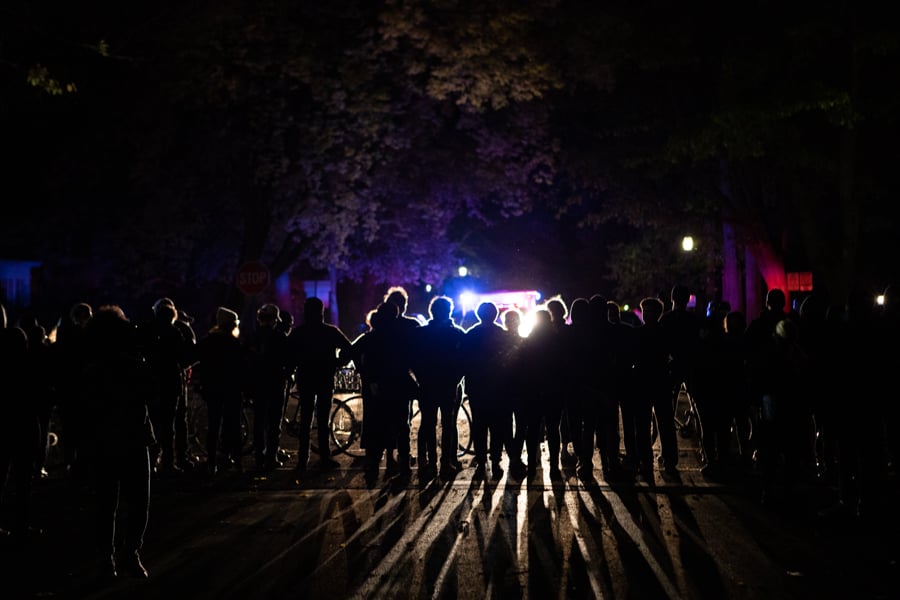Organizing during the pandemic: Activist groups on campus fight for changes, spotlight institutional problems
Daily file photo by Evan Robinson-Johnson
Months after Northwestern shuttered most in-person operations due to the pandemic, NU Community Not Cops hosted over 30 days of actions to advocate for abolishing University Police.
April 3, 2022
Two years ago, despite soaring COVID-19 positivity rates, protests broke out nationwide after police killed George Floyd. At Northwestern that fall — on an otherwise mostly empty campus — community members gathered for more than 30 days of action to abolish University Police and redirect funds toward institutions supporting students of marginalized identities.
NU Community Not Cops is one of several campus activist groups that gained traction after March 2020, even as the pandemic forced activists to organize virtually.
An NUCNC organizer and SESP sophomore who asked to remain anonymous for safety reasons said the pandemic highlighted systemic inequities at NU and nationwide.
“When the pandemic first started, and we were all in isolation (and feeling) that need for community, for truly nourishing, life-giving institutions, it became clear that those don’t exist right now,” the organizer said.
After its actions throughout fall 2020, NUCNC continued to protest through the spring and hosted a public meeting with administrators. In November 2021, NUCNC protestors joined other campus activists at Ryan Field during a football game.
Still, after an “electric” series of actions last year, the organizer said NUCNC has not been as active in recent months, especially given fluctuations in campus activism as older organizers graduate. But the easing of COVID-19 restrictions adds renewed urgency to NUCNC’s demands, she added.
“It shows the need for community care that’s not rooted in an ableism or carcerality,” the organizer said. “If we look at what this quarter would look like, we can tell that it’s not a safe place for immunocompromised students, it’s not a safe place for disabled students.”
Working conditions for immunocompromised students also remain a priority for Northwestern University Graduate Workers, co-chair Rose Werth said. NUGW has hosted spaces for students to vent and discuss how to navigate decreased COVID-19 protections, she said.
“I’ve heard from students who tried to reach out to either AccessibleNU or the Office of Equity that they have just gotten, ‘Well, there’s nothing we can do,’ or the burden of proving your condition is so high that nothing can actually happen,” Werth said. “It feels like the administration doesn’t care.”
While NUGW was founded in 2016, Werth said the group gained momentum when the pandemic brought light to the University’s treatment of graduate workers. When the University expected STEM graduate students to continue working in person, NUGW held a June 2020 “sick-out” to advocate for a universal funding extension and lab safety protections, among other demands.
“From there, the pandemic wasn’t just affecting laboratory workers. It was affecting everyone,’]” Werth said. “That has turned a lot of students towards unionization.”
Communication junior Lucy London, an organizer with Fossil Free NU, said divestment is a movement where NU is falling behind its peer institutions.
After a year of mostly virtual organizing, Fossil Free hosted an in-person Earth Day March last year.
“People were able to understand how interconnected the pandemic and racism and climate change and all of these issues are,” London said.
At the start of the pandemic, Students Organizing for Labor Rights organizer and SESP junior Neva Legallet said Compass Group told its dining and service workers they would be paid through Spring Quarter 2020. But Compass furloughed hundreds of workers, who were also not guaranteed health insurance.
“These workers at Northwestern, a lot of them live paycheck to paycheck,” Legallet said. “They were abandoned by Northwestern when they needed those paychecks the most in order to support their families and get access to health benefits.”
Dining workers faced challenges with understaffing and low wages before the pandemic. But Legallet said the pandemic highlighted how poorly NU and Compass treated service workers. In the early stages of the pandemic, SOLR shifted its activism to remote and raised mutual aid funds for dining and service workers.
Librarians on campus also unionized for better conditions during the pandemic, creating the Northwestern Library Workers Union, which became officially recognized in December 2021. Jill Waycie, a library assistant, said library workers were disproportionately affected by NU’s pandemic furloughs. She said she was one of about 50 library workers the University placed on unemployment.
“We really had no guarantee that we were going to get our jobs back,” Waycie said. “Along with being locked down and having a global pandemic, having this insecurity about your job’s status, it was very stressful.”
Library workers who continued working took on additional responsibilities that other colleagues previously held, but received no additional compensation, Waycie added.
Waycie said the pandemic was a catalyst for unionizing, especially as it brought issues surrounding work to light globally.
“The unionization, while we have our own issues specifically at the library, I feel like it’s part of a trend that people are looking more closely at what employers can and should be doing for their workers,” Waycie said.
In October 2021, NU dining and service workers voted to ratify a new contract with Compass. The contract increased worker wages to $19.88 an hour and extended health insurance benefits to all workers.
It was the first time the workers received a raise in more than two years.
“The pandemic has been devastating, but it’s also important to recognize the ways in which it has changed how we treat people,” Legallet said. “My hope is people are more appreciative of all of the people that work to make this community a community.”
Email: [email protected]
Twitter: @joannah_11
Email: [email protected]
Twitter: @maiapandey
Related Stories:
— Northwestern student activists, administrators debate demonstration policy


